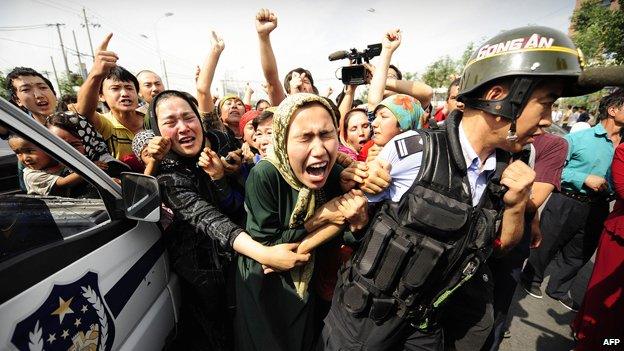Peers and ministers reach genocide rules compromise
- Published

Uighur women during a 2009 protest in China
The House of Lords has conceded defeat in its long-running battle to prevent the government striking trade deals with countries accused of genocide.
Peers dropped their attempt to change the Trade Bill to enable a panel of judicial experts to assess whether a regime was implicated.
Instead, a parliamentary committee will alert ministers to "credible reports" of widespread abuses.
The Lords had previously defeated the government three times on the issue.
The row has been fuelled by concern about China's treatment of the mainly Muslim Uighur people in Xinjiang province, hundreds of thousands of whom have been detained in camps.
Several Western countries have imposed sanctions - including travel bans and asset freezes - on officials, amid allegations of torture, forced labour and sexual abuse.
Tuesday's Lords debate on the Trade Bill followed a vote in the Commons on Monday, in which 29 Conservative MPs voted against the government, reducing its majority to 18 votes.
Peers accepted a compromise under which ministers will respond to the committees that alert them to reports of genocide.
But Lord Alton, the independent peer who led attempts to change the bill, said the arguments were not over and would continue as fresh examples of genocide emerged.
It was a "hugely important cause", he added, arguing that "great knowledge of the law" would be needed to deal with the issues involved.
The Trade Bill is now set to become law.
China has denied allegations of abuse at the camps in Xinjiang, claiming they are "re-education" facilities used to combat terrorism.
But Foreign Secretary Dominic Raab said the treatment of Uighurs amounted to "appalling violations of the most basic human rights".